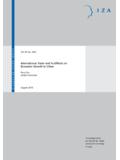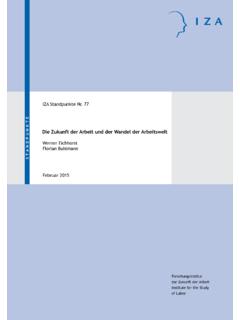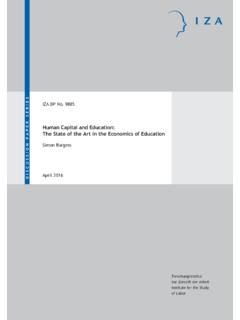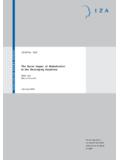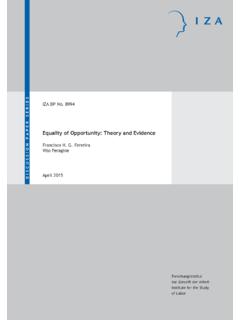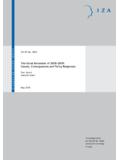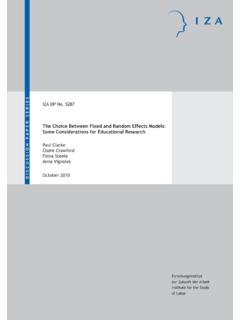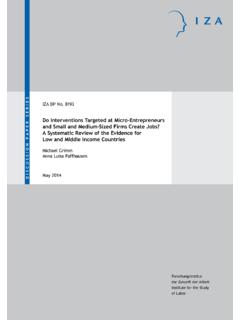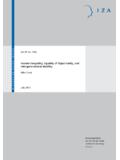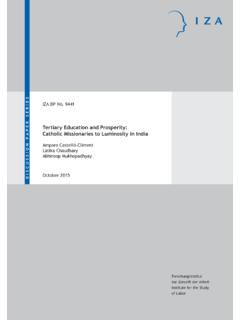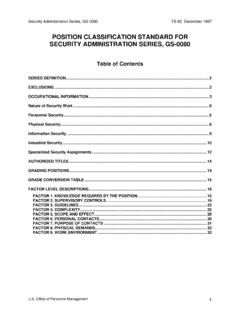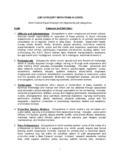Transcription of Job Security and Job Protection - IZA Institute of …
1 IZA DP No. 1489 Job Security and Job ProtectionAndrew ClarkFabien Postel-VinayDISCUSSION PAPER SERIESF orschungsinstitutzur Zukunft der ArbeitInstitute for the Studyof LaborFebruary 2005 Job Security and Job Protection Andrew Clark PSE and IZA Bonn Fabien Postel-Vinay PSE, CREST-INSEE, CEPR and IZA Bonn Discussion Paper No. 1489 February 2005 IZA Box 7240 53072 Bonn Germany Phone: +49-228-3894-0 Fax: +49-228-3894-180 Email: Any opinions expressed here are those of the author(s) and not those of the Institute . Research disseminated by IZA may include views on policy, but the Institute itself takes no institutional policy positions.
2 The Institute for the Study of Labor (IZA) in Bonn is a local and virtual international research center and a place of communication between science, politics and business. IZA is an independent nonprofit company supported by Deutsche Post World Net. The center is associated with the University of Bonn and offers a stimulating research environment through its research networks, research support, and visitors and doctoral programs. IZA engages in (i) original and internationally competitive research in all fields of labor economics, (ii) development of policy concepts, and (iii) dissemination of research results and concepts to the interested public.
3 IZA Discussion Papers often represent preliminary work and are circulated to encourage discussion. Citation of such a paper should account for its provisional character. A revised version may be available directly from the author. IZA Discussion Paper No. 1489 February 2005 ABSTRACT Job Security and Job Protection We construct indicators of the perception of job Security for various types of jobs in 12 European countries using individual data from the European Community Household Panel (ECHP). We then consider the relation between reported job Security and OECD summary measures of Employment Protection Legislation (EPL) strictness on one hand, and Unemployment Insurance Benefit (UIB) generosity on the other.
4 We find that, after controlling for selection into job types, workers feel most secure in permanent public sector jobs, least secure in temporary jobs, with permanent private sector jobs occupying an intermediate position. We also find that perceived job Security in both permanent private and temporary jobs is positively correlated with UIB generosity, while the relationship with EPL strictness is negative: workers feel less secure in countries where jobs are more protected. These correlations are absent for permanent public jobs, suggesting that such jobs are perceived to be by and large insulated from labor market fluctuations.
5 JEL Classification: J28, J65, I31 Keywords: perceived job Security , Employment Protection Legislation, Unemployment Insurance Benefits Corresponding author: Andrew Clark PSE (Paris-Jourdan Sciences Economiques) Ecole Normale Sup rieure 48 Boulevard Jourdan 75014 Paris France Email: This paper was originally prepared for the 2004 International Seminar On Macroeconomics (ISOM). We are particularly indebted to Anne Saint-Martin for her input to this and a companion paper (Postel-Vinay and Saint-Martin, 2003), and to Jean-Marc Robin for his decisive suggestions on the contents of this paper. Special thanks are owed to Thomas Bauer, Pierre-Olivier Gourinchas, Regina Riphahn and Alan Sutherland for very constructive discussions of the paper.
6 We are also grateful to Andrea Bassanini, St phane Bonhomme, Pierre Cahuc, Guy Laroque, Thierry Magnac and Eric Maurin for comments. Finally, we benefited from many constructive remarks and questions from conference and seminar audiences at CREST, IZA, Paris-Jourdan, Universit de Paris I, Universit d Evry and the 2004 ESSLE conference. The usual disclaimer applies. PSE (Paris-Jourdan Sciences Economiques) is a joint research unit CNRS-EHESS-ENPC-ENS. 1 IntroductionThe most common policies used to protect workers against labor market risk are EmploymentProtection Legislation (EPL) and Unemployment Insurance Benefits (UIB).
7 The effect of EPL onindicators of labor market performance is an arguably rare example of agreement among employment Protection is thought to discourage both firing and hiring, with an overallambiguous effect on the unemployment rate. The main effect of EPL is to reduce the permeabilityof the barrier between work and unemployment. This conclusion, which results from most recentequilibrium labor market models, is largely borne out by empirical generosity, onthe other hand, is less clearly related to aggregate labor market flows (or aggregate labor marketindicators in general). As such, UIB are generally thought of as being more compatible with thedemand for labor market there is apparent agreement on the macroeconomic impact of EPL and UIB, only veryfew studies have asked how these institutions affect workers perceptions of their job Security .
8 Yetthe question would seem to be of obvious importance, as it seems likely that policy makers areresponsive to the expression of public sentiments of social insecurity . The primary aim of thispaper is to address that balance between labor market flexibility and Security isa live policy issue. One of thecampaign posters of Arlette Laguiller, the candidate for one of the far-left wing parties callingitselfLutte Ouvri`ere(literally: Workers Struggle ), in the 2002 French presidential electionstated: Arlette Laguiller Always on the workers side Ban layoffs . The baseline argumentbehind the proposal to ban layoffs is that all-powerful shareholders use labor force adjustmentsto maximize their profits, and in so doing they let workers bear all the financial risk, thus creatingsocial insecurity.
9 Judging by the 2002 election results,3the idea to make layoffs illegal sounded1 See Addison and Texeira (2003), OECD (1999) or the excellent survey in Cahuc and Zylberberg (2004). Further,as it affects private decisions about job creation and destruction, EPL canobviously be thought of as serving a moregeneral purpose than just to protect workers against layoff risks. See Blanchard and Tirole (2004).2 While raising other standard incentive-related problems. Here also, we refer the reader to the correspondingchapter in Cahuc and Zylberberg (2004).3 Arlette Laguiller received of the votes. Yet the platfoms of at leastthree other left wing parties theLigue Communiste R evolutionnaire(Revolutionary Communist League), theParti Communiste Fran cais(FrenchCommunist Party) and theParti des Travailleurs(Workers Party) also contained similar proposals concerning1appealing to a nontrivial fraction of French more official view of the European Union on flexibility and Security is somewhat dif-ferent.
10 The 2003 Employment Guidelines for Member States4recommend that Member Stateswill facilitate the adaptability of workers and firms to change, taking account of the need for bothflexibility and Security [..]. Member States will review and, where appropriate, reform overly re-strictive elements in employment legislation that affect labour market dynamics[..]. While socialinsecurity is definitely a matter of concern in many official EUdocuments,5the current trend inaddressing social insecurity seems to be toward institutions that are more friendly to labor marketdynamics. In short, less EPL and, to an extent deemed reasonable, more extent to which the reforms actually implemented conform with those broad recommen-dations varies across Member States.
